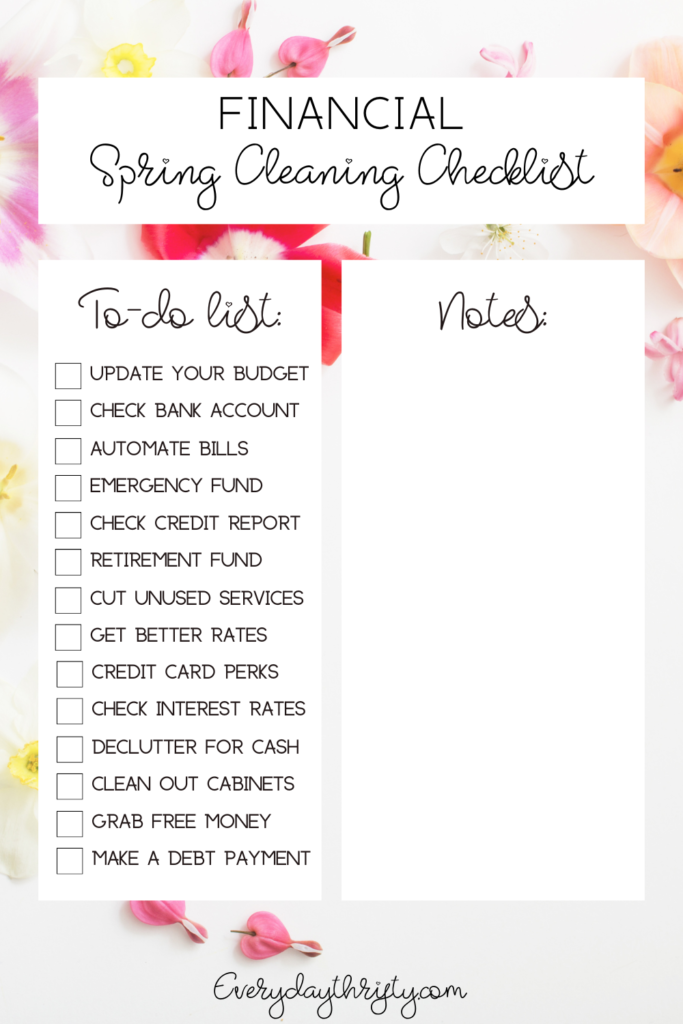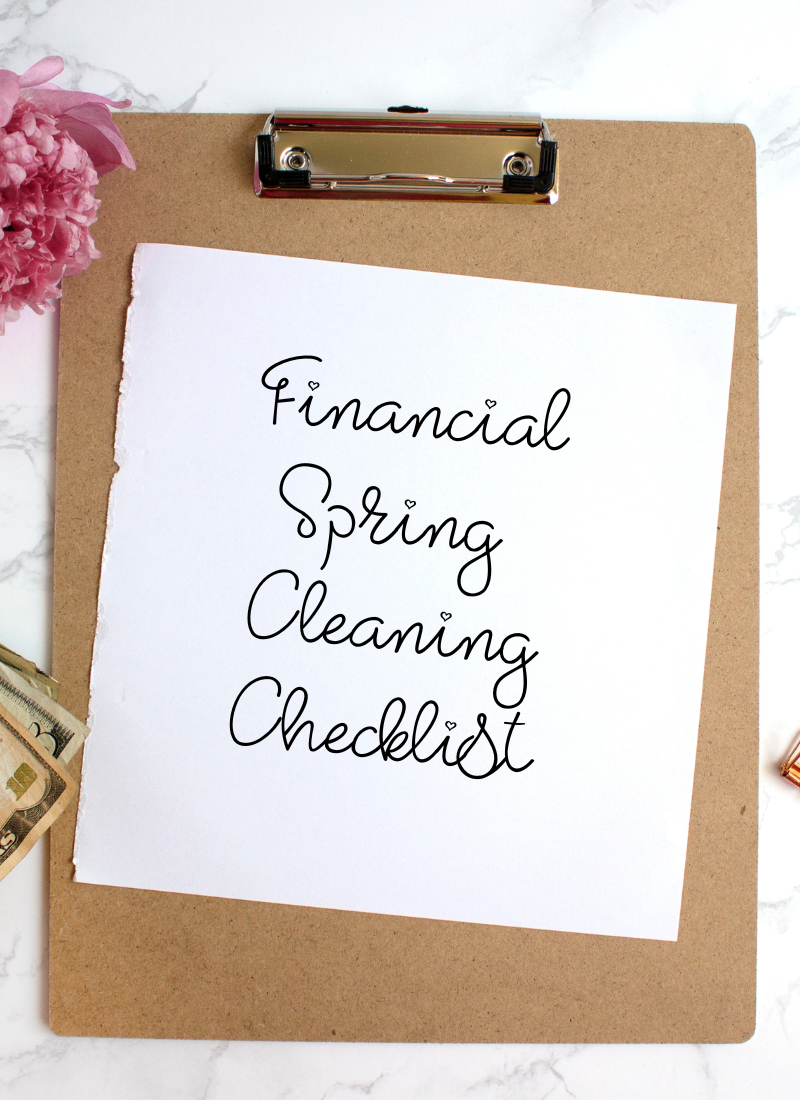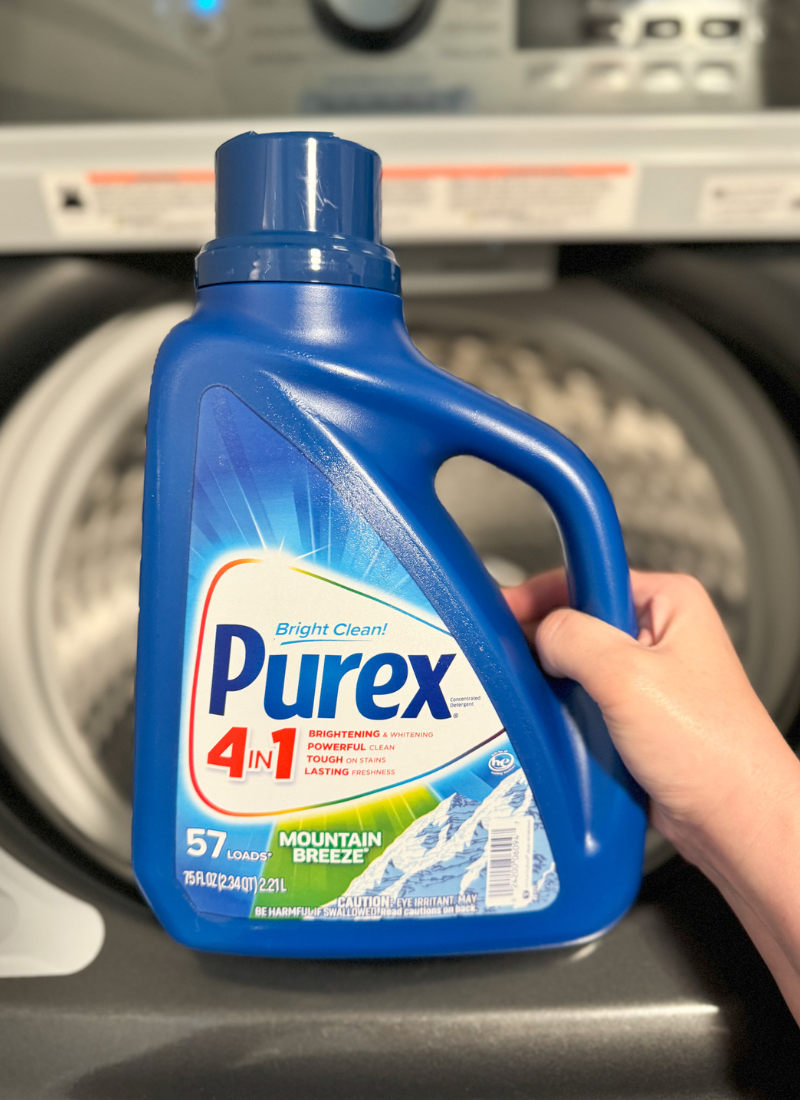Spring is in the air – birds singing, flowers blooming, and, of course, Spring Cleaning! But we’re not just referring to scrubbing all those hard-to-reach areas of your home or throwing out old knick-knacks. We’re talking about putting your finances in order to be more organized, more aware, more productive, and more financially free with some financial spring cleaning.
Financial spring cleaning involves rolling up your sleeves now, so you don’t look back in December and wonder where the year or where your money went. If you’ve struggled with staying on top of your finances like you know you should, we want to help you “get real” with your money! Just a couple of baby steps in the right direction is all you need to get some momentum on your side.
Let’s take a look at our list of financial spring cleaning tips that will help maximize your money.
Plus, be sure to grab this FREE Printable to check off each item and make personalized notes for yourself!
This post may contain affiliate links which means that I may receive compensation at no extra cost to you if you make a purchase from a link found on my site. Please review my privacy policy for further details. As an Amazon Associate, I earn from qualifying purchases. Thank you for your support in allowing this site to continue!

14 Ways to Kickstart Financial Spring Cleaning
1. Update Your Budget
Expenses and income change from time to time. So if you haven’t looked at your budget in a while, now’s the time.
Ask yourself a few questions:
“Is my budget realistic to what my expenses are?”
“Can I challenge myself more with my budget to save more, give more, or invest more?”
“Are my expenses vital to my happiness? Does anything need to be adjusted?”
“Are there patterns of exceeding my budget limit in any certain category? If so, what can I do to remedy that?”
2. Check Your Bank Account for Unusual Charges
Bank accounts get hacked and retailers make mistakes. You can’t blindly trust that only authorized purchases are coming out of your bank account from time to time. Let’s face it, problems occur. Common examples are rate increases, duplicate charges, overcharges, miscellaneous fees, rates that were negotiated but still not changed, fraudulent charges, etc. If you have the time, try to get in the habit of checking on your accounts each day. If that isn’t feasible for you, at least once a week, or at a minimum, once a month. Stay “in the know” with your money!
3. Automate Bills
When you automate your bills, late fees are a thing of the past. With the busyness of life, it’s easy to forget to pay a bill. But those late charges can really add up fast! We understand that automating bills carries a bit of risk since you’re trusting companies to withdraw the correct amount each time. But frequent bank reviews, as mentioned in the previous point, will help remedy that concern. Additionally, some companies give you a discount when you sign up for automatic payments.
4. Make a Debt Payment…No Matter How Small
The key to achieving any goal in life is just starting. It’s also one of the hardest things to do. Don’t worry if you don’t have a formal plan in place. To be honest, it doesn’t matter if you don’t know the difference between the Debt Snowball and Debt Avalanche approaches to paying off debt. Pick a debt that you’re carrying around and pay something extra on it. Any amount will help. If you need some guidance on how to get out of debt, check out the steps our family took to become debt-free!

5. Double Check Your Emergency Fund
Your emergency fund is crucial to your financial plan, especially when you’re getting out of debt. It’s there to make sure that you stay on track when tires blow out, roofs leak, and dental crowns break. If you don’t have at least $1000 in your emergency fund, add some money today. When you have $1000 in your emergency fund, it’s time to beef it up by setting aside 3 to 6 months of living expenses. If you have way more in your emergency fund then you need, then go ahead and use the excess to pay down debt or fund your retirement account.
6. Check Your Credit Report
Having a good credit score is important in the world we live in today. Your credit report is usually pulled for purchases such as a vehicle, an apartment or house, insurance, utilities, and sometimes even potential employers! You can check your credit report for free typically from your bank, credit card company, or online at Annual Credit Report.
How do you increase your credit score?
- Pay your bills on time
- Keep balances low on credit cards
- Pay off your debt
- Don’t accept offers to open credit cards from retailers
- Strongly limit “hard inquiries” on your report
In addition to taking a peek at your current credit score, you need to verify that there are no credit report inaccuracies under your name. If there are, you need to dispute such errors to correct your score.
7. Increase Retirement Contributions
If your employer offers a 401K or other retirement fund, take full advantage! Most companies will match a certain percentage of money that you contribute to your plan. If you’re not at least meeting the company match, that’s the best place to start. You’ll be doubling your money without any effort at all!
If you are taking full advantage of a company-sponsored retirement plan, then consider increasing your contribution or opening an individually funded account like a Roth IRA. Any small lump sum of money or slight increase in contribution now will give even the smallest investment ample time to grow into something far more substantial in the future.
8. Drop Unused Services
Have you ever signed up for a subscription service like Hulu or a gym membership only to realize that you don’t really use it? If you have, then it’s time to take inventory of all those recurring services that you pay for and assess the value they provide you. Do the services you pay for enrich your life or clutter it up? If they’re providing more clutter than actual value, then it’s time to cancel. Any freed-up cash can be used to pay off debt or invest for the future.
9. Shop for Better Rates
If you can’t drop a service, then the next best thing to do is some comparison shopping. If you haven’t shopped your home and auto insurance, Internet service, or alarm monitoring in the last few years, then you’re probably not getting the best rate. Even if you decide not to take your business to another company, you can often use competitor quotes to negotiate better rates with your current service providers.

10. Review Credit Card Perks
We love credit card perks! You can get cashback rewards or discounts on travel on the expenses you pay anyways. If you currently use a credit card to take advantage of rewards on everyday purchases, then it may be time to compare perks. If you haven’t compared offers in a while, then check out sites like Nerd Wallet and Bankrate to make sure that you’re getting the most out of your money.
11. Compare Bank Account Interest Rates
In addition to comparing credit card rewards, you can use Nerd Wallet and Bankrate to compare interest rates on checking and savings accounts. Let’s face it, some bank accounts aren’t great. We’ve seen some with no interest whatsoever and recurring fees for basically no reason. So, if you’re using a bank that charges you unnecessary fees and no interest, take your money somewhere else. Online banks tend to have the best deals. But if you’re more comfortable with a brick and mortar establishment, check out a local credit union.
12. Declutter and Earn Some Cash
This option is what we tend to think of when we say, “Spring Cleaning.” Roll up your sleeves, dig around in the attic, and dust off all those old appliances, clothes, and books. It’s time to have yourself a good old fashioned yard sale. Keep an eye out for vintage toys, comic books, board games, and video games which often sell for a higher price online on sites like Amazon or eBay.
13. Check Expiration Dates
Take an inventory of your kitchen cupboards. Chances are you have products that are about to expire. We all overbuy from time to time. Rather than buying more, gather up all of those soon-to-be expired products and get creative. Work these food items into your weekly menu or make them part of a No Spend Weekend. Wasted food is wasted money! For more tips on how to make the most of your money on groceries, don’t miss: How to Save Money on Groceries: the ULTIMATE Guide!
14. Take Advantage of Free Money
There’s free money out there if you know where to look. We’ve already mentioned your company retirement plan. If you have one and haven’t started contributing up to the company match, get that started as soon as you can. If you don’t use a credit card for everyday purchases, then you’re missing out on usually 1-3% cashback on everything you buy.
There are a number of rebate apps like Ibotta and Checkout 51 that pay you just for uploading receipts on items you’ve purchased. And if you’re not getting the most out of our birthday freebies, then where have you been?! Check out your favorite restaurants online to see if they have a Rewards Club. You’d be surprised at all of the free meals you can get on or around your Birthday. So maybe it’s not technically “free money,” but free food is as good as money in my book! Lastly, check out the United States Government Unclaimed Money site to see if you have any money owed to you that you’re unaware of!

If you’ve made it to the bottom of this post, you are clearly motivated to clean house when it comes to your money! We’re excited for you to tidy up that budget, cut costs, maximize your investments, and get working on those goals.
Don’t forget to grab your FREE Financial Spring Cleaning Checklist!
We’d love to hear from you! What was your financial spring cleaning favorite tip? What item are you going to check off your list first?





Leave a Reply